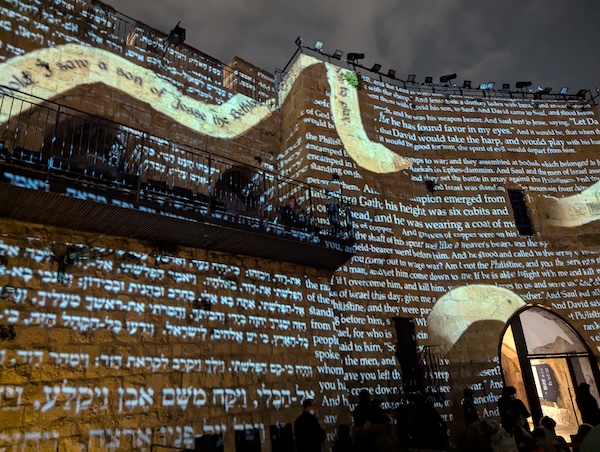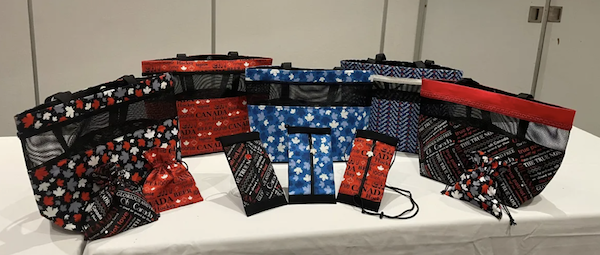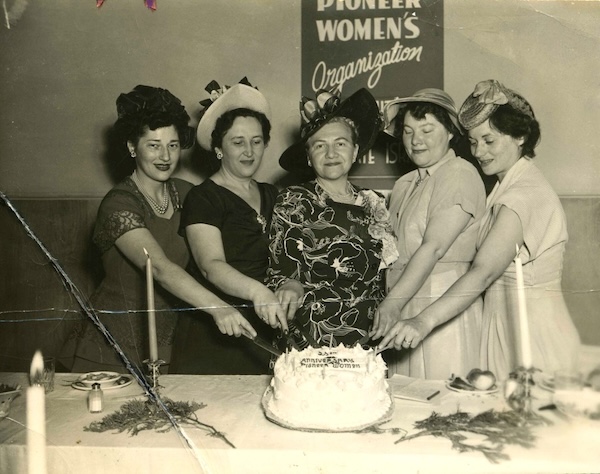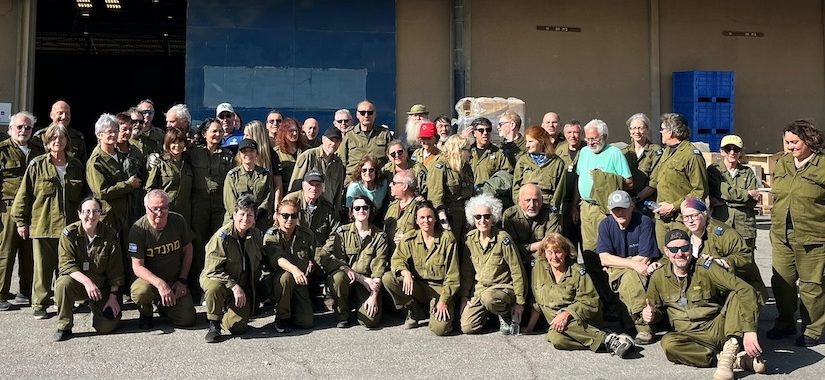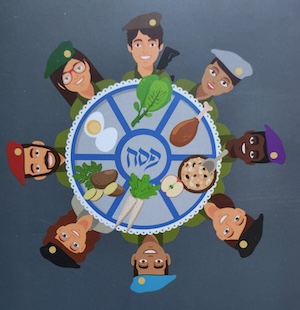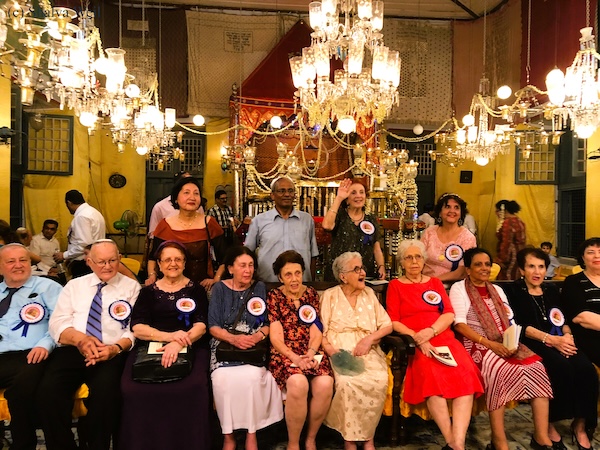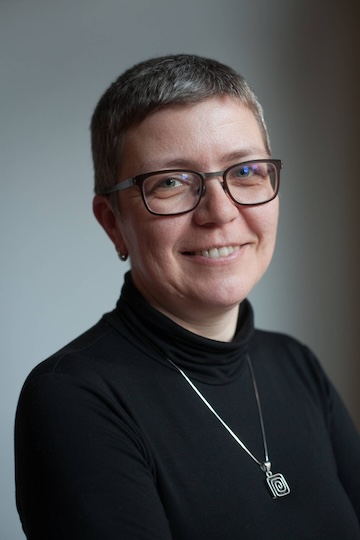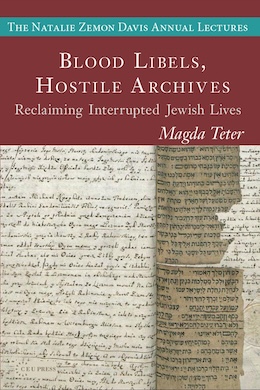Light projections on the internal walls of the Tower of David, in Jerusalem, part of the Night Spectacular. (photo by Pat Johnson)
Tourism to Israel plummeted after Oct. 7, 2023. For example, January 2024 saw an 80% drop in visitors from a year previous. Those who did travel to Israel were often on solidarity missions or volunteer programs.
In March, I visited for 10 days, speaking with scores of Israelis about the situation, their grief, determination and changed attitudes, among other things. During that period, there was not a single siren in central Israel, though, days after my departure, the ceasefire ended and war in earnest began again.
It may seem frivolous or disrespectful to speak of “tourism” or “sightseeing” in moments such as these. The example of Israelis, however, is, as ever, resilience and getting on with it. Museums are open and, no matter what brings you to Israel, making time for recreation is necessary and, in many cases, adds depth to the understanding of what is happening now. A few of my destinations and choices are a bit odd – not what every visitor might choose – but others, like the Tower of David, should be on your must-see list.
Story of Jerusalem
The Tower of David Museum tells the story of Jerusalem. With a multimillion-dollar investment in new technologies upgrading the experience, the centrality of the city of Jerusalem in multiple traditions is underscored by the imagery of the city as the “navel of the world.”
From 5,000-year-old idols and 3,000-year-old stamps indicating a thriving bureaucracy, to Theodor Herzl and the modern state, the museum tells the story of a place with more history than geography.
A not-to-be-missed component is the immersive, after-dark sound and light show called the Night Spectacular. Perhaps less informative than just, well, spectacular, the 40-minute program projects the epochs of the city’s history (that is, its litany of invasions) onto the interior walls of the imposing citadel. Combo tickets to the museum, permitting evening entry for the show, are available. The effect is all-immersing, more powerful and moving than I could have anticipated. It will captivate visitors of every age.
History of Jewish militias
Like the Haganah Museum in Tel Aviv (see below), the Museum of the Underground Prisoners Jerusalem takes a politically ecumenical approach to the history of Jewish militias fighting the British in pre-state Israel.
Located in the former British Mandate-era jail, the museum tells the story of resistance fighters from the Haganah, the main defence force of the pre-state Jewish community, the Revisionist Irgun (Etzel) and the more radical Lehi (“Stern Gang”).
Jewish prisoners were captured and punished for sabotage against the British, including the smuggling of Holocaust survivors and others into Palestine. Some of the prisoners were executed in the prison yard and these lives are commemorated movingly.
Holocaust remembrance
Yad Vashem: The World Holocaust Remembrance Centre is always a moving pilgrimage. The primary exhibit space – an A-frame hall with windows at the peak, reminding us that the events took place in full view of the world (and, arguably, God) – provides a chronological history of the Shoah. The slash across the top of the Moshe Safdie-designed building also represents the permanent scar this history has left on humankind.
Like the Tower of David, Yad Vashem has had a huge infusion of money to update the exhibits and add high-tech components.
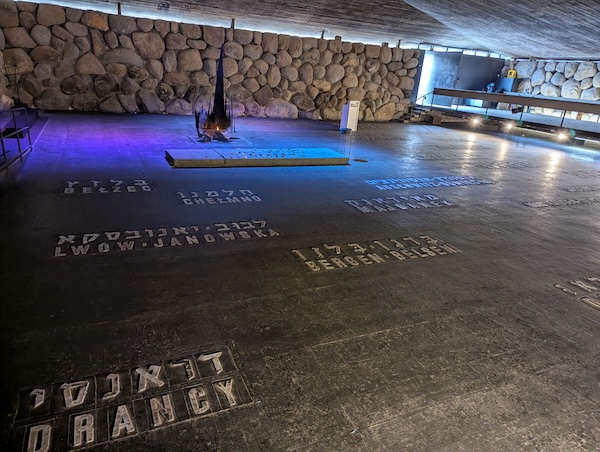
A simple, but crucial, aspect of the exhibit is at the start, after visitors traverse the “bridge to a vanished world,” and a short film loops the story of the pre-Shoah Jewish civilization that was destroyed. This contextualizing of what was lost is an irreplaceable part of the experience.
The permanent exhibit, including the emotional Hall of Names, is what the public most often sees and it provides the history of the Holocaust for people of all levels of knowledge. The vast work of the centre remains mostly out of sight, with archives, research, recording and publication being a less visible but no less important component of Yad Vashem’s mandate.
Har Herzl Pathway
For a British Columbian, it is hard to fathom what Israelis call “mountains.” The Mount of Remembrance (home to Yad Vashem) and Mount Herzl (or Har Herzl) are hardly recognizable as distinct geographic places, let alone mountains.
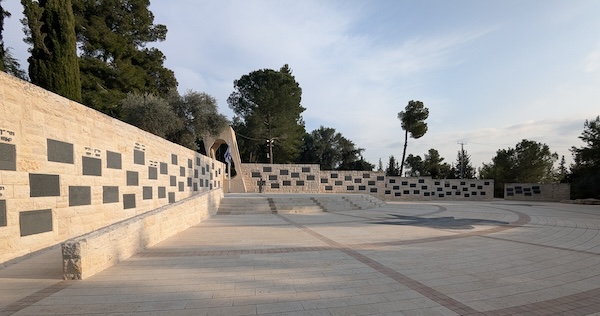
In any event, from Yad Vashem, it is a relatively short walk to the Herzl Museum, which is adjacent to the grave in which the founder of political Zionism was reinterred in 1949 from his original resting place in Vienna.
Between these two destinations are the resting places of most of Israel’s leaders, as well as cemetery after cemetery filled with soldiers and civilians killed in Israel’s successive wars and terror attacks.
It was only by happenstance – well, if you are arriving by foot, you can’t miss it, but those arriving by vehicle might – that I discovered a memorial walking path between Yad Vashem and the Herzl Museum, snaking through these sad, chronological rows of graves.
The trail, as a distinct entity, is a bit of a mystery. A post-trip web search indicates there is seemingly not even an agreed-upon name for the path. The information at the entryway says that it was developed by Jewish youth movements but the specific groups go unnamed. The signage is likewise a bit perplexing, without always clear directions or explanations. The larger message, though, does not require plinths: Israel and thousands of Israeli families have paid an enormous price for the country’s existence.
Learning about Herzl
Having meandered through the sombre cemeteries of Israel’s war dead and the resting places of most of the country’s prime ministers, presidents and other historical greats, you arrive at the imposing grave of Theodor Herzl. Nearby, the museum bearing his name tells the story of the man with the crazy dream of a Jewish state.
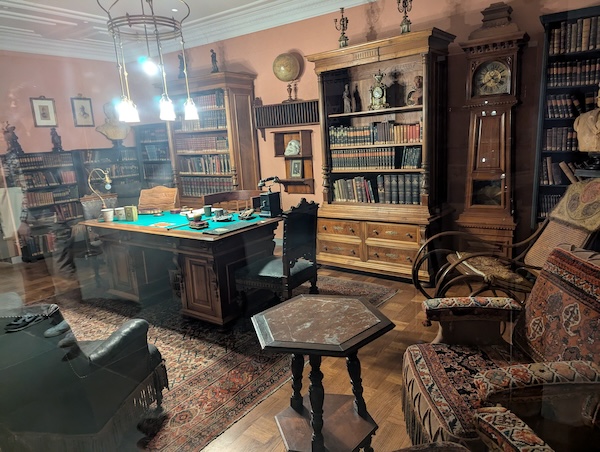
Museum-goers are given a guided tour from room to room, following a cheesy video of a pair of dramatic impresarios didactically directing an actor preparing for the role of Herzl but who has no idea who the man was. The actor (and, not at all subtly, the visitor) is educated on the Dreyfus Affair, which was the polarizing moment when the secular, assimilated Herzl concluded the Jews would never be free without a state of their own. The displays take visitors through his activism, and we eventually join delegates at the First Zionist Congress.
The museum includes the re-creation of Herzl’s home office and many important relics of his life.
Connecting past, present
Gush Katif Museum is an unexpected little museum in Jerusalem’s Nachlaot neighbourhood, which tells the story of the 17 Jewish settlements that were evacuated during the “disengagement plan” from Gaza in 2005.
The Israeli government withdrew from Gaza two decades ago in hopes of allowing a sort of pilot project in Palestinian self-government. In the process, and amid (yet another) emotional national dialogue, Jewish settlements in the enclave were evacuated.
With a decidedly political agenda, the museum finds relevance today, as many Israelis look at the situation in Gaza and, with 20/20 hindsight (or something like it), question every decision that may have led to today’s realities.
In an interesting thought experiment, a Jewish resident evacuated from Gaza, speaking in the museum’s introductory film, inverts the common perception of Jewish settlements in the area. Rather than the probably prevailing view of Jewish settlements as an imposition on Palestinian land, he makes the case that Israel gave 90% of Gaza to the Arabs and some still wanted to erase the Jewish presence entirely. (Ignoring the ideological point and contesting the details, Jewish settlements in the Gaza Strip took up something around 20% of the land in the small area.) It’s a perspective that challenges the idea that, even absent a negotiated two-state solution, the Palestinians deserve 100% of the occupied territories. Presumably, it is just this type of questioning the museum hopes to engender.
The Gush Katif Museum explores more than modern history, of course, going back to the earliest Jewish settlement in the area, and the successive expulsions by the Romans and the Turks.
Origins of the IDF
Moving on to Tel Aviv, the Haganah Museum tells the story of the Jewish militia that morphed, upon statehood, into the Israel Defence Forces.
The museum is located on Rothschild Boulevard, in one of Tel Aviv’s oldest buildings, originally the home of Eliyahu Golomb, a founder and ideological leader of the Haganah.
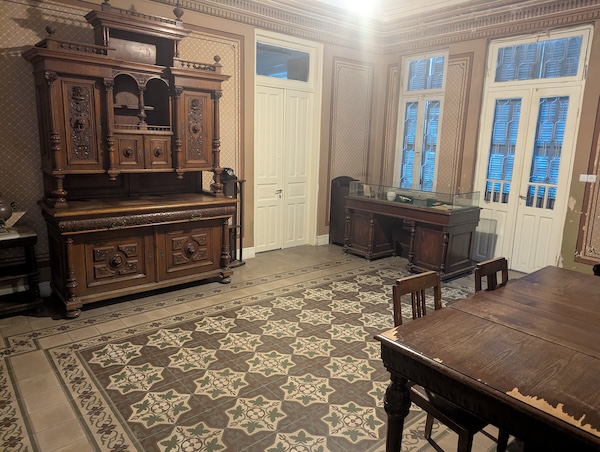
While there were other military operatives, the Haganah was the de facto militia of the Yishuv, the pre-state Jewish community. The museum, though, takes a broader view, beginning with the role of “tower and stockade settlements” on the peripheries of the proto-state, through the First World War Zion Mule Corps, the Jewish Legion (which helped the rise to prominence of Revisionist leaders like Ze’ev Jabotinsky), and touches on the roles of Revisionist Etzel (the Irgun) and its breakaway group Lehi (the “Stern Gang”) in taking the fight to the British. In an ideological and military skirmish after independence, these groups would be forcibly unified into the IDF.
The museum includes the crucial role the Haganah played in the Aliyah Bet, the illegal migration of Jews into pre-state Israel during the period of British blockade of Jewish refugees.
At the entry to the building is a relief mural by Israeli sculptor Moshe Ziffer, with figures in traditional kibbutz-style clothing, linking the movement to the pioneering Zionist ethos, as well as fighters shielding and defending Jewish families. There are also ancient symbols in the artwork, implying the Maccabean revolt, and including modern symbols of the transition to statehood, in 1948.
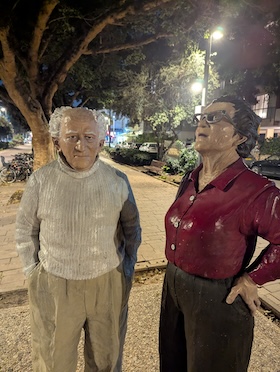
Independence Trail
The Haganah Museum is a central part of the cobbled-together tourist route branded “Independence Trail.” What would ostensibly be the centrepoint of the trail – Independence Hall, the home of Tel Aviv’s first mayor, Meir Dizengoff, and the place where David Ben-Gurion read aloud Israel’s Declaration of Independence on May 14, 1948 – is surrounded by scaffolding amid ongoing renovations without a set date for reopening.
An easy-to-follow map of the ambling tour is available at the tourism kiosk in the pedestrian boulevard between the Haganah Museum and Independence Hall. The tour begins (if you want to do it in un-Israeli orderly fashion) at the city’s first kiosk, a restoration of which still serves refreshments to Tel Avivians and tourists.
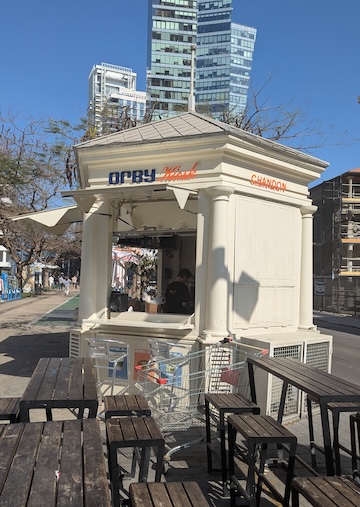
The walk continues past the Nahum Gutman Fountain, which depicts the history of Jaffa and its sister-city-come-lately Tel Aviv, from the setting-off place of Jonah on his way to the fish’s belly, through Egyptian invaders, Crusaders, Napoleonic forces on up to Herzl and to the Declaration of Independence that took place a few steps away.
Other stops on the trail include the site of Herzliya Hebrew Gymnasium, the world’s first modern Hebrew-language high school; the Palatin Hotel, the resting stop for famous names of the 20th century; Tel Aviv’s Great Synagogue; several buildings that are notable more for being examples of the Bauhaus or International Style of architecture than for historical import; the Tel Aviv Founders Monument; a statue of Dizengoff, astride his horse; and several others. The map and trail provide a quick and easy guide to important sites that you might otherwise overlook in a small area of central Tel Aviv.
Tragic walking tour
An unusual, if not terribly uplifting, activity is the Tragic Tel Aviv Walking Tour, which visits sites in the city centre where terror and even Second World War attacks killed civilians.
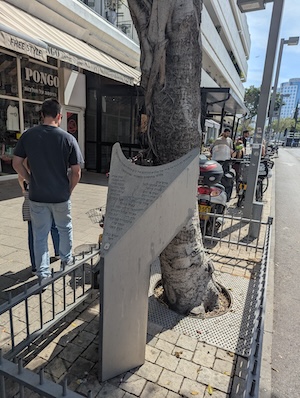
On Sept. 9, 1940, Italian war planes operating from the island of Rhodes, made sorties over Haifa and Tel Aviv, killing 137 people, with many more injured. The attacks targeted no Allied (that is, British) military infrastructure and shattered what, to then, had been a feeling of relative isolation from the European war among the residents of pre-state Palestine. The monument to the bombing in Mikhoels Square, at the corner of Levinsky and Aliyah streets, is modest and easily overlooked if you are not explicitly seeking it – or even if you are.
Led by former Torontonian Jeffrey Levi, the tour then proceeds through sadly seemingly endless locations of suicide bombings and other terror attacks, many of which took place during the Second Intifada. In some cases, the historical events that left Israelis dead or wounded are not commemorated at all, or are marked by likewise inconspicuous markers.
If there is an uplifting message in this tour, it is in the innocuous manner in which most of these historical tragedies are commemorated (or not). As Levi recounts the devastations of the past, Tel Avivians hustle by, literally and figuratively moving past the past.

